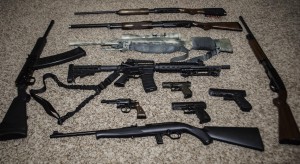While a majority of Utahns oppose gun control laws, they overwhelmingly support background checks on potential gun buyers.
This is according to the results of a January poll conducted by Key Research in collaboration with BYU’s Center for the Study of Elections and Democracy.

The CSED pollsters contacted 500 likely Utah voters from the public file of registered voters, asking a variety of questions by telephone. Six questions were asked about gun laws; those participating in the questionnaire were asked to indicate whether they favor or oppose specific gun control proposals.
When asked whether they support a federal law requiring background checks on all potential gun buyers, 82 percent indicated they favored the law.
However, when asked about various other gun control measures, including restricting the sale of high-capacity magazines that hold many rounds of ammunition and a nationwide ban on semi-automatic weapons, a clear majority of Utahns were in opposition.
Quin Monson, director of CSED, explained that the poll shows there is a lot of opposition to gun regulation in Utah, with the exception of background checks, where “there’s pretty much a consensus.”
“Across all sorts of categories of politics and demography, different party groups and different ideological groups all seem to be OK with (background checks),” Monson said.
“It’s a gun control measure that doesn’t seem threatening,” added Kelly Patterson, professor of political science at BYU and senior research fellow at CSED. “It seems rather innocuous compared to all the other gun control measures, and most individuals can agree that guns should not be in the wrong hands.”
Monson explained in the context of recent tragedies, mental illness and criminal behavior come to mind in the gun control conversation. People generally agree that guns should not be in the hands of mentally ill or people of criminal background, but he said, “if the background check evolved to mean something else, then we might find that there’s opposition to it.”
Utah resident and gun owner Dallas Hemeyer, from Heber City, explained why his beliefs are in line with the findings of the poll.
“I do feel like it’s everyone’s right to have a gun for the protection of themselves and their family,” he said, but then noted that there are exceptions, such as certain criminal actions that should forfeit one’s right to own a handgun.
“I do believe that guns need to be in the right people’s hands — people who know what they’re doing — and that’s why I think background checks need to happen.”
Although the percentage of Utahns who support background checks on potential gun buyers is very high, it is still about 10 percent lower than the nation’s average, according to analysis on utahdatapoints.com by Ian Hansen, a student research fellow at CSED.
“Utah is always a little more conservative,” Patterson said. “Utahns are more likely to oppose a ban on semi-automatic weapons than are the average citizen in the nation.”
Hansen’s analysis also noted the poll results are in keeping with patterns elsewhere in the country, as differences exist along party lines. Those who considered themselves to be Democrat or leaning Democrat were much more likely to support gun control laws than were Republicans and leaning Republicans.
Additionally, the poll suggested Utahns are not sure how they feel about arming schoolteachers. A question asking whether increased pay should be offered to teachers to receive concealed weapons training drew no obvious conclusion.
“Put guns and schools in the same sentence, and it makes people nervous,” Monson said.
According to Monson, the poll was conducted as part of the center’s mission, which is to do non-partisan academic research that is useful to policymakers and informs the public.
“We try to cooperate on these surveys so that we have fresh data to be a part of the discussion on some of these important issues,” Monson said, explaining there is a lack of consistent producers of public opinion data in Utah.




